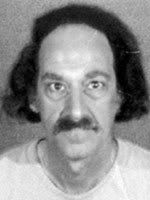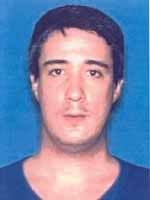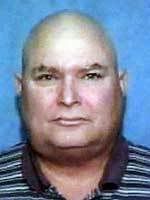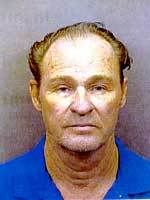Monday, October 30, 2006
Stop the genocide
Posted October 30, 2006
The government of Sudan is widely believed to be behind the genocide in the country's Darfur region that has claimed more than 200,000 lives and driven millions from their homes. Yet even with a new surge in violence, the United Nations is still waiting for permission from that same government to deploy a peacekeeping force to stop the killing. No wonder some critics of the United Nations consider it worthless.
It's way past time for the U.N. Security Council to dispatch the peacekeepers, whether or not Sudan's leaders agree.
U.N. intervention in a country against its wishes should be reserved for exceptional cases. But genocide more than meets that standard.
For three years, Arab militias backed by Sudan's government have looted, burned, raped and murdered their way through black African villages in Darfur to suppress a rebellion in the region. Two years ago, then-Secretary of State Colin Powell correctly labeled it genocide. A recent report from the United Nations itself concluded, "Government knowledge, if not complicity, in the attacks is almost certain."
A 7,000-troop African Union peacekeeping force in Darfur has been unable to stop the violence. That force lacks the manpower, equipment and mandate.
Now, amid recent gains by the rebels, Sudan's government is vowing a new offensive to crush them. Last week, the government kicked out the United Nations' top envoy in the country. And Sudan's president, Omar al-Bashir, also threatened to expel humanitarian relief groups and foreign media from Darfur. Hundreds of thousands more lives are in peril.
The Security Council passed a resolution in late August calling for a 22,000-troop U.N. peacekeeping force to replace the smaller African Union force in Darfur. Ideally, African and Arab countries would supply the manpower.
The presence of U.S. and European troops in yet another Muslim country could ignite opposition that would hamper a peacekeeping mission. But the United States and its European allies can work through NATO to provide logistical support for the U.N. force and take other steps to assist it, such as establishing a no-fly zone over Darfur.
If the United States and other council members are committed to ending the nightmare in Darfur, they will apply all their diplomatic leverage to overcoming opposition to intervention from China and other apologists for Sudan.
A little more than a decade ago, the United Nations failed to stop a genocidal rampage in Rwanda that left hundreds of thousands of people dead. A U.N. refusal to intervene in Darfur would deal another crushing blow to its credibility, and confirm the harshest views of its critics.
Dayton Daily News
Not only that... but the Dayton Daily News attacked the Governor of Ohio, the Attorney General of Ohio and Bill O'Reilly for reporting the story and actually asking for the removal of Judge Connor. The vicious personal attacks launched by the Dayton Daily News were strange when contrasted to the lack of condemnation for the judge.
So, can one conclude therefore that the Dayton Daily News is a newspaper that has sympathy for child rapists and the judges who will not incarcerate them?
If you are as outraged as Bill is you can contact Jeff C. Bruce the editor of the Dayton Daily News (JBruce@DaytonDailyNews.com) and Jay R. Smith the President of Cox Newspapers Inc. (Jay.Smith@Coxinc.com) which owns the newspaper and let them know how you feel about this.
Teen Arrested for Raping His Mother
Police say 19-year-old Gary Helms, Jr., raped his 45-year-old mother this past weekend at Willow Terrace Trailer Park on Doyle Drive in Albertville.
It's a twisted crime that police say Helms admits.
"From what we understand the rape stemmed from an argument between him and his brother. And apparently they were arguing over a girlfriend. And the rape was some sort of retaliation towards his brother," said Sgt. Jamie Smith of the Albertville Police Department.
It was unusual retaliation on an unsuspecting victim.
Authorities say Helms' mother was apparently passed out drunk on the couch when the rape started.
"During the attack she did come to and recognize her attacker. (Reporter: As her son?) As her son," said Smith.
That's when, according to the police report, the mother "tried to get away, but he held her down until he was finished."
"It's totally sick is what it is," said Smith.
Helms was arrested and charged with the 1st degree rape of his own mother.
Smith says it's hard to wrap your mind around.
"Shocked, shocked would be more a better way to describe it. That somebody would dip to the lows to do something of this nature. It's just pretty much a shock to the conscience of the general public," said Smith.
Helms is being held in the Marshall County Jail on $100,000 bond.
Sunday, October 29, 2006
Seeking Information about Unknown Suspect



Unknown Suspect
KNOWINGLY DISTRIBUTING OR AIDING IN THE DISTRIBUTION OF VISUAL DEPICTIONS, VIA INTERSTATE COMMERCE, OF A MINOR ENGAGING IN SEXUALLY EXPLICIT CONDUCT
THE DETAILS SURROUNDING THE CRIME
Law enforcement officials are seeking information which will lead to the identification of this unknown suspect. On September 28, 2006, a federal grand jury in the United States District Court, Southern District of Florida, indicted this individual and charged him with knowingly distributing or aiding in the distribution of visual depictions, via interstate commerce, of a minor engaging in sexually explicit conduct. Images of this person abusing a young girl were found in a video on the Internet in May of 2005.
The individual is described as a White male, approximately 180 to 200 pounds, with brown hair. He has a dark circular mark on his right forearm (Shown Above).
The current whereabouts of this individual are unknown.
IF YOU HAVE ANY INFORMATION CONCERNING THIS PERSON, PLEASE CONTACT YOUR LOCAL FBI OFFICE OR THE NEAREST AMERICAN EMBASSY OR CONSULATE.
China faces suspicions about organ harvesting
A pair of human rights activists are charging that "a crime against humanity" is happening on a large scale in China. Members of Falun Gong, a spiritual movement banned by the Chinese government since 1999, are being "in effect, murdered for their organs," which are being sold to buyers from China and abroad, says David Kilgour, a former member of the Canadian Parliament and coauthor of the report.
Mr. Kilgour and his partner, Canadian human rights lawyer David Matas, are now traveling the world speaking with governments and professional and human rights organizations urging further investigation of the allegations. Early last month, the pair released a report laying out details of an investigation they undertook on behalf of a Falun Gong support group, the Coalition to Investigate the Persecution of the Falun Gong in China.
"Ideally, we would like to pursue further research before we come to any firm conclusions," the two conceded, while noting the difficulty in obtaining accurate information within the closed society of the People's Republic of China.
But while the evidence may not persuade everyone who reads their report, it is strong enough in their minds to render a verdict. "Based on what we now know, we have come to the regrettable conclusion that the allegations are true," the report says. "We believe that there has been and continues today to be large-scale organ seizures from unwilling Falun Gong practitioners."
The source of some 41,500 organ transplants in China in the years 2000 through 2005 remains unexplained, leading to the possibility that they may be the result of the execution of Falun Gong members, the report says.
The Chinese government "since 1999 have put to death a large but unknown number of Falun Gong prisoners of conscience," the report alleges. Their vital organs were seized involuntarily "for sale at high prices, sometimes to foreigners, who normally face long waits for voluntary donations of such organs in their home countries."
The Falun Gong movement, whose guiding principles are truthfulness, compassion, and forbearance, was founded in China in 1992 by Li Hongzhi, who now lives in the United States. Its philosophies incorporate ideas from Buddhism and Taoism and include slow-motion meditative exercises. Falun Gong is generally seen as a peaceful and law-abiding movement outside China, but within its borders it is officially deemed a dangerous cult. For several years, Falun Gong followers around the world have been actively protesting the treatment of the movement's adherents inside China.
The Chinese Embassy in Canada issued a reply to the Kilgour-Matas report July 6, the same day the report was released. China abides by World Health Organization principles that prohibit the sale of human organs and require written voluntary consent from donors, the statement said. "It is obvious that their purpose is to smear China's image," the statement continues. "[T]he so-called 'independent investigation report' made by a few Canadians based on rumors and false allegations is groundless and biased."
In a phone call, a spokesman for the Chinese Embassy in Washington, Li Jianhua, also called the allegations "totally fake" and said the Chinese government had already investigated the claims and found them meritless.
But by immediately dismissing their report "out of hand," Kilgour and Mr. Matas said in a reply, the Chinese government has admitted that it has conducted "no investigations to determine whether or not what the report contains is true."
Whether the organ harvesting - taking corneas, livers, hearts, and kidneys for transplantation - is being done as part of the official crackdown on Falun Gong or simply as the result of local corruption in prisons and hospitals around China is not clear, Matas says, and may be a result of both motives. China has a history of harvesting organs from executed prisoners, he says. The number of Falun Gong prisoners in China remains a mystery outside China. The Falun Gong "are completely defenseless in prison: unidentified, no protectors," Matas says. "They become an easy victim for this form of greed."
The Kilgour-Matas report "makes a very convincing case," says Kirk Allison, associate director of the Program in Human Rights and Medicine at the University of Minnesota. He says academic journals and conferences now should take an ethical stand to reject papers and presentations from authors who rely on data derived from transplantations performed in China.
"Given the evidence at hand, international transplant patients who obtain organs in China do so at the cost of benefiting from, and tacitly supporting, the continuance of an ongoing lethal violation of human dignity and human rights," Dr. Allison said in a published statement circulated at the World Transplantation Congress in Boston last week. "Prospective patients should be informed of this fact and actively discouraged from pursing this avenue of treatment."
Kilgour took on the Falun Gong project last spring after retiring from the Canadian Parliament, where he had been elected as a member since 1979. Neither he nor Matas are Falun Gong practitioners.
In March, the Chinese government announced that a new law, to take effect July 1, would ban sales of human organs and require that donors give written permission for their organs to be transplanted. But, according to Kilgour, the fact that a new law was passed "highlights the fact that there is no such legislation in place now."
Darfur's silent killer

I have not eaten now for over 48 hours due to sickness and diarrhoea. It has left me feeling exhausted and extremely grumpy - those around me would confirm this in an instant. I have been taking antibiotics and drinking plenty of water and flat cola, none of which seems to be having any positive effect with my stomach still feeling like it holds bubbling toxic lava.
It has been a more than unpleasant past two days, yet as much as I have complained, I feel I am in no position to do so.
Chronic sickness and diarrhoea is a common problem in Darfur, especially in the camps for IDPs (internally displaced people).
Aid workers here speculate that in some camps as many as one in five children suffer from sickness and diarrhoea at any one time. They focus on the children because for them diarrhoea in these conditions can be a very serious problem.
It means children are left even more weak and vulnerable than they would be usually - what little nutrition they are getting, their meagre bodies are not absorbing.
In Camp Al-Salaam, just outside Nyala, South Darfur, eight children were reported to have died from chronic diarrhoea within the last month.
On a recent visit to Camp Otash, also on the outskirts of Nyala, the dangers of diarrhoea became only too apparent.
I came across a little boy named Hawa Abdullah. Hawa (pictured here) is six years old but could well pass for much younger. When I met him his wrists were, without exaggeration, as thin as my thumb. His skin hung off his arms, so flaccid it seemed as though he had no muscle at all.
The mass of flies swarming around his face didn't bother him. He barely moved, could barely breathe and was so exhausted he could hardly keep his eyes from shutting. His body just hung in his mother's arms.
His sickness meant he was severely malnourished. He had been eating - not much, but enough to keep a child of his age alive. The problem was that everything was going straight through him.
Had he not been found by aid workers, I have no doubt he would now be dead.
"I wonder how many other Hawas there are out there?" one aid worker remarked to me as the boy was taken off for further treatment.
Of the 2.5 million people uprooted by the conflict in Darfur around 700,000 are estimated to be children. But any speculation of the percentage with sickness and diarrhoea would be nothing but a wild guess.
Bugging me right now isn't just how many children are ill, but also how many will get the treatment they need to survive.
Saturday, October 28, 2006
British documentary alleges pope linked to "child abuse cover-up"

Pope Benedict XVI
A British documentary claimed that Pope Benedict XVI was implicated in the systematic cover-up of child sex abuse allegations against Catholic priests.
Before becoming head of the church, the then cardinal Joseph Ratzinger enforced church doctrinal orthodoxy, including a "secret Vatican decree which seemed to shelter the perpetrators and silence the victims of abuse", the Panorama programme said.
This was the 1962 document Crimen Sollicitationis, which told top churchmen how to deal with priests who "solicit or provoke the penitent toward impure and obscene matters", according to a translation from Latin on the BBC website.
It imposed an oath of secrecy on victims, witnesses and those probing abuse claims and said that anyone breaking this would be excommunicated, the BBC said.
Father Tom Doyle, a canon solicitor reportedly sacked by the Vatican after criticising its handling of child abuse claims, told the BBC that Crimen was "an explicit written policy to cover up cases of child sexual abuse by the clergy, to punish those who would call attention to these crimes by the churchmen."
But the programme's claims have provoked a furious response from the Catholic Church in Britain.
The Archbishop of Birmingham, in central England, the Most Reverend Vincent Nichols, told Britain's Press Association news agency that it used Vatican documents "quite misleadingly in order to connect the horrors of child abuse to the person of the pope."
Speaking on behalf of bishops in England and Wales, he accused the BBC of "a deeply prejudiced attack on a revered world religious leader".
And he added that the Catholic Church in England and Wales was working to protect children with transparency and care.
Ratzinger clarified church law on the issue in 2001 and Panorama reported that he had ordered that the Vatican must have "exclusive competence" for child abuse cases.
"It's all controlled by the Vatican and at the top of the Vatican is the pope so Joseph Ratzinger was in the middle of this for most of the years that Crimen was enforced," Doyle added.
The pope could "tomorrow" order that the church take strong action against those accused of child sex scandals and co-operate with legal proceedings.
The Catholic Church told the Press Association that the second, 2001 document does not hinder investigations of child abuse allegations and that Crimen is not directly linked to child abuse but deals with the misuse of the confessional.
Cardinal Cormac Murphy-O'Connor, the Archbishop of Westminster, central London, and spiritual leader of Catholics in England and Wales, has written to Mark Thompson, the BBC's director-general, to protest about the programme.
The BBC said it was standing by it and would respond to the letter when they received it.
The programme was presented by Colm O'Gorman, who was abused by a priest as a boy and is now director of One In Four, an Irish charity which supports people who have been sexually abused.
"What gets me is it's the same story every time and every place.
"Bishops appoint priests that they know have abused children in the past to new parishes and new communities and more abuse happens," he said on the programme.
The show also claimed to have found seven priests facing child abuse investigations living in and around Vatican City.
Panorama told its viewers that the Vatican had failed to respond to requests for interview.
ALLEN'S REVENGE: EXPOSES UNDERAGE SEX SCENES IN OPPONENT'S NOVELS

Thu Oct 26 2006 20:05:37 ET
Sen. George Allen, R-VA, unleashed a press release late Thursday that exposed his rival's fiction writing, which includes graphic underage sex scenes.

The press release, as provided by the Allen Campaign:
WEBB’S WEIRD WORLD
The Author’s Disturbing Writings Show a Continued Pattern of Demeaning Women
· Some of Webb’s writings are very disturbing for a candidate hoping to represent the families of Virginians in the U.S. Senate.
· Many excellent books about the United States military and wartime service accomplish their purposes, and even win awards, without systematically demeaning women, and without dehumanizing women, men and even children.
· Webb’s novels disturbingly and consistently – indeed, almost uniformly – portray women as servile, subordinate, inept, incompetent, promiscuous, perverted, or some combination of these. In novel after novel, Webb assigns his female characters base, negative characteristics. In thousands of pages of fiction penned by Webb, there are few if any strong, admirable women or positive female role models.
Why does Jim Webb refuse to portray women in a respectful, positive light, whether in his non-fiction concerning their role in the military, or in his provocative novels? How can women trust him to represent their views in the Senate when chauvinistic attitudes and sexually exploitive references run throughout his fiction and non-fiction writings?
· Most Virginians and Americans would find passages such as those below shocking, especially coming from the pen of someone who seeks the privilege of serving in the United States Senate, one of the highest offices in the land:
– Lost Soldiers: “A shirtless man walked toward them along a mud pathway. His muscles were young and hard, but his face was devastated with wrinkles. His eyes were so red that they appeared to be burned by fire. A naked boy ran happily toward him from a little plot of dirt. The man grabbed his young son in his arms, turned him upside down, and put the boy’s penis in his mouth.”
Bantam Books, NY, 1st Edition, 2001, (hard cover), page 333.
Quote is from para. 10,.Chap. 34.
– Something to Die For: "Fogarty . . . watch[ed] a naked young stripper do the splits over a banana. She stood back up, her face smiling proudly and her round breasts glistening from a spotlight in the dim bar, and left the banana on the bar, cut in four equal sections by the muscles of her vagina."
William Morrow and Company, Inc., NY 1991, 1st Ed. (hardcover), p. 36.
Avon Books, New York, 1992 (Mass-Market paperback edition), p. 35
Quote is from para. 29, Chap. 2 “The South China Sea,”, Section 2
– A Country Such as This: "[He] could see Jawbone and Ashley Asthmatic [two guards at a Vietnamese prison camp] napping together in the grass. They faced inward, their arms entwined. It looked like they were masturbating each other. It didn't surprise him. … It was common to see men holding hands, embracing, playing with each other. Some of them [the guards] had wanted him. He could tell in those evanescent moments between his bao cao bow, the obligatory deference when a guard entered his cell, and the first word or blow that followed it… Quick, grinding voices, turgid with repressed passion. An exploratory reaching of the hand near his groin…”
Doubleday & Co., Garden City, NY, 1983 (hardcover); page 396.
Bluejacket Books, 2001 (Trade paperback edition), page 396
Page numbers are the same in the Naval Institute Press (paperback) edition, 1983.
Quote is from fifth para, Part 5 “A Country Such As This,” Chap. 24, Section 1
– A Sense of Honor: “Nurse Goodbody, dark and voluptuous (Lenahan had forgotten her actual name, it was something long and Italian), was a bedtime friend to many of the doctors in Bethesda. She had hinted to Lenahan that she simply could not contain herself. Doctors tending to patients, she explained, aroused her. Morphine Mary (again Lenahan could not remember her exact name) was a thin, nervous drill sergeant type, a disciplinarian who did not allow her patients even to complain. Lenahan was convinced that Morphine Mary did not even sleep with her husband. She wasn’t bad looking, he mused again, staring at her thin frame. If she’d just get laid every now and then she’d mellow out and stop being such a damn witch.” (p. 164) (Lenahan brings Goodbody home with him and has sex, pp. 188-190)
Prentice-Hall, New York, 1981 (hardcover)
Bantam, New York, 1982 (Mass-Market paperback edition), p. 164
Trade paperback edition, Bluejacket Books, 1995, p. 164
Quote is from fourth para in Part 3, “Chapter 4:1600”
– Something to Die For: "[Fogarty] has been thinking of the firm, springy skin and the sweet smells of a young Filipina woman named Maria in whose bed he had spent three nights almost twenty years ago. . . . She was a deliciously bad young woman. . . . On the second night, he had brought her a box of Godiva chocolates . . . . he had awakened to find her in the bathroom, sitting on the toilet with her knees underneath her chin, eating chocolates and counting her rosary beads as she prayed."
William Morrow and Company, Inc., NY 1991, 1st Ed. (hardcover), p. 32.
Avon Books New York, 1992 (Mass-Market paperback edition), p. 30
Quote is from third para in Chapter 2 “South China Sea,”, Part 2
– Something to Die For: "We're on our way to becoming the world's recreational center, a nation [USA] not to be taken seriously. Where are we still the undisputed leader? Music. Movies. Fast food. Drugs. . . . the billboards fifty years from now as you come over the bridge and stop at the tollbooths outside Manhattan: A smiling beautiful naked woman, and the sign saying AMERICAN ASS IS OUR MOST IMPORTANT PRODUCT."
William Morrow and Company, Inc., NY 1991, 1st Ed. (hardcover), p. 199.
Avon Books New York, 1992 (Mass-Market paperback edition), p. 237
Quote is from para. 38, Chap. 13, Part 1, (five paras before Part 2).
– Fields of Fire: Snake (the protagonist) sees his mother on the bed: "She looked as if she were carefully attempting to re-create a picture from some long-forgotten men's magazine . . . . She was naked underneath the robe . . . . and the robe fell loosely away, revealing her. Snake shrugged resignedly."
Prentice-Hall, New York, 1978 (Hardcover, 1st edition), p. 8
Bantam Books "mass market [paperback] edition" published in Sept. 2001. p. 9.
Quote is from paragraphs 18-23, Part 1 “The Best We Have”, Section 1
(NOTE: Part 1 is after the Prologue)
– Fields of Fire: "He saw the invitation with every bouncing breast and curved hip. . . . He was thirteen. . . . She was fifteen . . . . In a few moments she drew him to her and he murmured in his quiet voice, 'I am still small.' 'You are large enough,' she answered. And he found he was."
Prentice-Hall, New York, 1978 (Hardcover, 1st edition), pp. 211-212
Bantam Books "mass market [paperback] ed." published in Sept. 2001, pp. 280-81.
Quote is from paragraphs 8-20, Part 2 “The End of the Pipeline,” Chapter 24
– A Sense of Honor: “… that is, if you knew who your sister was, Brustein, and if she’d been born with anything between her legs except an asshole, I’d be happy to bring some class to your low-rent name by knocking the bitch up.” (p. 223)
Prentice-Hall, New York, 1981 (hardcover)
Bantam, New York, 1982 (Mass-Market paperback edition), p. 223
Trade paperback edition, Bluejacket Books, 1995, p. 223
Quote is from 17th para in Part 4, “Chapter 7:1930”
– A Sense of Honor: “You wouldn’t have believed it, Swede. She just dropped her britches and lifted up her skirt and pissed like a man. Didn’t lose a drop, either. Not a drop.” (p. 183)
Prentice-Hall, New York, 1981 (hardcover)
Bantam, New York, 1982 (Mass-Market paperback edition), p. 183
Trade paperback edition, Bluejacket Books, 1995, p. 183
Quote is from 23rd para in Part 3, “Chapter 8: 2300”
END
Webb Says His Novels 'Inappropriate' for News Radio

Jim Webb
Democratic candidate for U.S. Senate in Virginia
By Nathan Burchfiel
CNSNews.com Staff Writer
October 27, 2006
(Editor's note: Corrects quote in the 10th paragraph.)
(CNSNews.com) - In an interview on Washington Post Radio Friday morning, Jim Webb, the Democratic candidate for U.S. Senate in Virginia, said excerpts of his novels are "a little bit inappropriate" to be read on news radio.
"I don't know why you're reading that on WTOP," Webb told host Mark Plotkin. "I think it's a little bit inappropriate."
Plotkin was reading an excerpt from Webb's novel "Something to Die For," in which Webb describes a female stripper performing sexual acts with a banana.
"I don't think that's appropriate for you to read on WTOP," Webb said again as Plotkin finished the excerpt. (Washington Post Radio is WTOP's sister station.)
The campaign of Republican Sen. George Allen on Thursday released excerpts from some of the war novels Webb wrote between 1978 and 2002. The books include some graphic sexual passages, as well as frequent uses of a racial slur for blacks and descriptions of Vietnamese women as "monkey-faced."
Among the excerpts is a scene from the 2002 novel "Lost Soldiers," in which a man embraces his four-year-old son and places the boy's penis in his mouth.
Webb said the release of the excerpts was "a Karl Rove campaign tactic" and a "classic example of the way this campaign has worked. It's smear after smear."
He defended his fiction as "illuminative."
"It's not a sexual act," Webb told Plotkin regarding the "Lost Soldiers" excerpt. "I actually saw this happen in a slum in Bangkok when I was there as a journalist."
"The duty of a writer is to illuminate the surroundings," he added.
Coincidentally, a Cambodian woman in Las Vegas is facing sexual assault charges for performing a similar act on her young son, according to an Oct. 14 report in the Las Vegas Review-Journal.
The article quotes an office manager for the Cambodian Association of America, who described the act as a sign of respect or love.
"It's an exception," Thira Srey told the Review-Journal of the practice. According to the report, the act is usually performed by a mother or caretaker on a child who is one year old or younger. In Webb's novel, the child is four years old.
Webb criticized the Allen campaign for focusing on excerpts from his novels.
"The most important issue facing the country, he hasn't got a statement to make on it," Webb said of the Iraq war. "This country's been breaking into pieces economically ... they've got no position on that.
More:
Allen Blasts Webb Novels For Sex Scenes
India tackles domestic violence
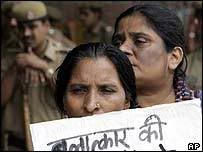
A landmark new law seeking to protect women from domestic violence has come into effect in India.
The law also bans harassment by way of dowry demands and gives sweeping powers to a magistrate to issue protection orders where needed.
Punishment could range from a jail term of up to one year and/or a fine of up to 20,000 rupees ($450).
Every six hours, a young married woman is burned, beaten to death or driven to commit suicide, officials say.
Overall, a crime against women is committed every three minutes in India, according to India's National Crime Records Bureau.
Despite the scale of the problem, there had been no specific legislation to deal with actual abuse or the threat of abuse at home.
Domestic violence, under the new law, includes "actual abuse or the threat of abuse whether physical, sexual, emotional or economic," a statement from the federal ministry of women and child development said.
Wall of silence
The law provides protection to the wife or live-in partner from violence at the hands of the husband or live-in partner or his relatives.
Besides physical violence, the law also covers forcing a wife or partner to look at pornography.
"We have been trying for long to protect women from domestic violence. In India alone, around 70% of women are victim of these violent acts in one or the other form," junior minister for women and child development Renuka Chowdhury told the Press Trust of India news agency.
She said the news law would help provide relief to the women suffering from domestic violence.
Women's activists have welcomed the law, although many say it is not perfect.
They say a bill alone will not help in preventing domestic abuse; what is needed is a change in mind sets.
A survey by the International Institute for Population Studies showed 56% of Indian women believed wife beating to be justified in certain circumstances.
The reasons varied from going out without the husband's permission to cooking a bad meal.
Domestic abuse is often denied by the victims themselves.
Ongoing 'intifada' in France has injured 2,500 police in 2006
This might have dropped below the radar, but Al Qaida and its allies are literally battling the Crusaders every day in Europe. And so far, Europe isn't doing so well.
"We are in a state of civil war, orchestrated by radical Islamists," said Michel Thoomis, secretary general of the Action Police trade union. "This is not a question of urban violence any more. It is an intifada, with stones and firebombs."
The French Interior Ministry has acknowledged the Muslim uprising. The ministry said more than 2,500 police officers have been injured in 2006. This amounts to at least 14 officers each day.
The battles have been under-reported but alarming to French authorities. Muslim street commanders, who run lucrative drug networks, have organized youngsters in housing projects to ambush police and confront security forces. The response time allows hundreds of Muslims to storm police cars and patrols within minutes.
"You no longer see two or three youths confronting police," Thoomis said. "You see whole tower blocks emptying into the streets to set their comrades free when they are arrested."
France's huge Muslim minority community has come under the influence of agents often influenced and financed by Al Qaida. These agents have recruited Muslim youngsters for urban warfare in which police and government representatives are injured daily.
Not surprisingly, Muslim neighborhoods are becoming autonomous zones, with police and government workers too scared to enter. The police union is demanding the Interior Ministry supply officers with armored cars.
European law enforcement sources say France could be a model for other countries. The most worried are Britain and the Netherlands.
Friday, October 27, 2006
Lord's Resistance Army (LRA)
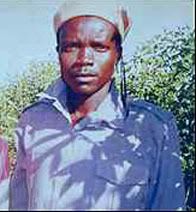
Joseph Kony
The Lord's Resistance Army (LRA), formed in 1987, is a rebel paramilitary group operating mainly in northern Uganda. The group is engaged in an armed rebellion against the Ugandan government in what is now one of Africa's longest-running conflicts. It is led by Joseph Kony, who proclaims himself a spirit medium, and apparently wishes to establish a state based on his unique interpretation of Biblical millenarianism. The LRA have been accused of widespread human rights violations, including mutilation, torture, rape, the abduction of civilians, the use of child soldiers and a number of massacres.
Bishop Oliver O'Grady

Deliver Us From Evil
A documentary
In theaters October 13, 2006
A Glimpse at the Mind of a Pedophile
A former priest who served under Mahony in the Stockton Diocese describes his ploys.
By Jean Guccione - LA Times Staff Writer
May 11, 2005
In a chillingly frank account, a former Roman Catholic priest, promoted 20 years ago by Roger M. Mahony, recently described his decades-long career as a pedophile, including his sexual tastes and how he groomed his young victims for abuse.
In a 15-hour videotaped deposition in March, Oliver O'Grady described how his heart raced when one of the slim, playful boys he preferred toweled off after a swim. He also said he liked to lift little girls' skirts and peek at their underpants.
Asked to demonstrate how he would lure one of his estimated 25 victims into his arms, the 59-year-old Irish native softened his voice, flashed an avuncular smile and looked directly into the video camera.
"Hi, Sally," O'Grady improvised. "How are you doing? Come here. I want to give you a hug. You are a sweetheart. You know that. You are very special to me. I like you a lot."
If his hug met no resistance, O'Grady testified, he would take the child's compliance as "permission" to molest.
The deposition came in connection with lawsuits filed against the Stockton Diocese over alleged abuse by clergy. Mahony, who was bishop of Stockton from 1980 to 1985 before heading the Los Angeles Archdiocese, inherited O'Grady, who had admitted years earlier to molesting an 11-year-old girl. In 1984, police investigated a therapist's report that O'Grady had molested a boy.
After police declined to file charges, Mahony transferred O'Grady to a rural parish and later promoted him to pastor there, where he allegedly molested three more victims, including a baby girl who suffered vaginal scarring, according to plaintiffs' lawyers. Mahony has said he was unaware of any molestation reports. The additional victims were molested after he left the diocese.
"The cardinal acted on the information he had, just as the police investigator did," church attorney Don Woods said.
Costa Mesa-based plaintiffs' attorney John C. Manly conducted the deposition in Ireland. The now-defrocked priest, an Irish citizen and native of Limerick, was deported from the U.S. in 2001, after serving seven years in California state prison for sexually abusing two brothers. He lives in Thurles, Ireland.
A transcript of the deposition was filed Tuesday in Alameda County Superior Court, where the Stockton Diocese is defending four lawsuits alleging that the church failed to protect parishioners from abuse. Manly filed the transcript in opposing a church motion to dismiss one of the suits.
O'Grady, on the video, asked why church officials did not remove him from ministry after he committed the molestations.
"I think it probably would have been best if, back in 1984, they said, 'Look, we need to put a halt to this. We need to take you out,' " O'Grady told lawyers during the questioning. "But even the 1984 situation, as I understand it, was handled as best it could have been handled at the time."
Woods said Tuesday that O'Grady "was not trying to say what should have been done. He's saying I wish it could have been done differently.
"It's a lament from hindsight," he said.
An attorney for the Stockton Diocese, Paul Balestracci, declined to comment, noting the open lawsuits over O'Grady's misconduct.
O'Grady's deposition offers a far-reaching, and often disturbing, glimpse into the mind of a convicted pedophile. Still, there were times during the marathon question-and-answer session when he was less than candid.
He refused to name any of his 25 victims, invoking his 5th Amendment right against self-incrimination. He at first denied molesting one little girl, then the next day admitted that he had lied and that he had abused her. He said his abuse ended in the mid-1980s, but in his criminal case he had pleaded guilty to molestations as late as 1991.
Although O'Grady voiced remorse for his abuses, he often appeared to be enjoying his videotaped performance. At one point, he winked into the camera.
O'Grady testified that he was molested as a child by two priests in the sacristy of his church. The first occurred when he was 10 and an altar boy, he said.
The priest "began the conversation by asking how I was, what I was going to do for the day, and I remember he was — he called me over to him and he began to hug me, you know, in a kind of gentle way, first of all.
"Then he turned me around … which means I had my back to him with him standing behind me, and then the hands would come down and hug me here and then went lower."
When he was growing up, he testified, he was involved in molestation within his family, both as perpetrator and victim. And when he was a teenager, he added, a priest touched him sexually.
"It was not a very pleasant experience on some occasions, but it was a very normal thing. Nobody talked about it," he said. "I did not consider it a very serious criminal matter."
O'Grady testified that his own sexual attraction to children began before he was ordained a priest in 1971.
"The only thing I understood religion to say at the time was that anything … to do with sexuality was sinful, and that is where a lot of my conflict came," he testified.
His first assignment as a priest was to the Stockton Diocese in 1971. Five years later, O'Grady testified in an earlier deposition, he fondled an 11-year-old girl he had met at a summer camp and invited to sleep over at the rectory.
"I remember going into her bed, and I tried to caress her and fondle her, and I sensed her objections to that, nonverbally, and I stayed for a little while more and then decided not to continue. So I left and went back to my own bed," he told lawyers during the March deposition, estimating that he had spent no more than 20 minutes in the girl's bed.
The girl's parents complained to then-Bishop Merlin Guilfoyle, who preceded Mahony in Stockton. O'Grady testified that the bishop, who is now deceased, confronted him and he confessed.
O'Grady wrote the family a letter of apology, angering Guilfoyle, O'Grady said. The letter was in O'Grady's personnel file when Mahony assumed the bishopric, according to court records.
O'Grady said he suffered no repercussions for his transgression.
"Life just continued," he testified.
Court records show that in 1984, four years after Mahony became bishop of Stockton, O'Grady told his therapist he had fondled a 9-year-old boy. The therapist alerted child welfare officials, and police opened an investigation.
O'Grady took the 5th Amendment when asked during the deposition what he told his therapist. But he testified that Mahony was out of town at the time, so he told the bishop's second-in-command about the investigation. He said the official sent him to talk to the diocese's lawyer.
The child, who had been asleep during the alleged molestation, said he was unaware of any abuse, and police declined to file charges. Court records show, however, that police said an attorney for the diocese promised that O'Grady would be transferred to a job where he would not have contact with children, and that he would be sent to therapy.
O'Grady testified that Mahony sent him to a psychiatrist for an evaluation, which the cardinal has acknowledged was the church's standard operating procedure at the time for handling pedophile priests. Almost immediately thereafter, O'Grady said, Mahony transferred him to a parish in San Andreas, about an hour outside Stockton. Mahony later promoted him to pastor.
There was no school at his new assignment, but O'Grady testified that he supervised hundreds of students who came in on weekends and after school to study Catechism.
Mahony has testified in court that he never saw the letter of apology O'Grady wrote to his female victim's family. He also said that he did not know the details of what O'Grady had told his therapist and that once police declined to file charges in connection with the 9-year-old boy, he saw no reason to investigate further.
O'Grady "was in counseling at the time," Woods said, "and the second opinion that the diocese obtained said the counseling was satisfactory and he should continue with it.
The second opinion did not recommend that he be removed from ministry, nor did the [evaluation] render any diagnosis of pedophilia."
After years of therapy, O'Grady said, he's embarrassed and ashamed of his sexual attraction to children.
But asked to describe his "type," he gave an animated response. "Generally, a boy who was — spontaneous, affectionate, playful, generally around the age of 10, 11, and who seemed to maybe need somebody to care for him. I'm not saying that he necessarily had family problems but seemed to identify with me as somebody who he could trust, who he could come to, who was willing to take care of him."
The priest searched his congregation for submissive children. "If they demonstrated affection, by hugging and that sort of stuff, it sort of awakened within me urges to be affectionate in return," O'Grady testified.
"If I got comfortable doing that and felt he was comfortable with me hugging him, and I had thoughts or feelings that I wanted to go further, I might at that time explore that possibility," he said.
"I might have to do a little planning … to be sure that the boy was there, to be sure the boy was alone, and that there was not any hurry on him leaving."
O'Grady testified that he had sexual relationships with two mothers of children he molested. He also said he occasionally wore women's lingerie he found among donated clothes left at his church.
"Perhaps I was trying to use external things to arouse myself," he said.
A Stockton jury in 1998 awarded one of O'Grady's victims $30 million, later reduced to $7 million. Jury members told The Times they thought Mahony was untruthful on the witness stand, that he had allowed O'Grady's pattern of abuse to continue.
Mahony said he thought the jurors were wrong and that he took extraordinary steps to protect children.
Over the years, O'Grady said, he tried to understand and possibly curb his appetite for children — reading books about his disorder, touring a residential treatment center for pedophile priests and eventually opening his parish to secret Sex Addicts Anonymous meetings so he could attend.
After O'Grady was released from prison and returned to Ireland, the Stockton diocese paid for him to undergo three years of outpatient therapy, he said, and also agreed to pay him $800 a month for 10 years starting on his 65th birthday.
"I would have liked somebody in the diocese or somebody to have intervened as early as possible in helping me confront this situation as a very, very serious one," he said, "and help to educate me to the very serious nature of the problem that I had and was causing."
Each time he reached into a child's pants, O'Grady said, he knew his conduct was wrong, "definitely a sin." But there was "another part of me saying, 'I can't seem to control these desires, thoughts, feelings when they come.' "
After a molestation, O'Grady testified, he always went to a priest and confessed his sin.
Copyright © 2005, The Los Angeles Times
Monday, October 23, 2006
Sudan denies directing Janjaweed
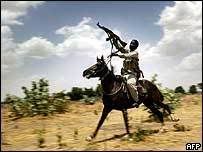
Sudan's government has rejected new allegations that it is giving direct support and orders to the Janjaweed Arab militia in the Darfur region.
A Sudanese Foreign Ministry spokesman told the BBC his government was instead working hard to try to disarm them.
Earlier, a UK asylum seeker known as Ali, who said he was in the Janjaweed, told the BBC he saw ministers giving orders at their training camps.
Ali said he took part in village raids after bombings by Sudan's air force.
He said the majority of casualties were civilians and that he had witnessed Janjaweed fighters raping women.
Khartoum has always denied any links to the Janjaweed, who have been accused of war crimes against civilians in Darfur.
More than two million people have fled their homes during the three-year conflict and more than 200,000 are estimated to have died.
Asylum
Sudanese government spokesman Ali al-Sadek told the BBC's Arabic Service that he believed the former Janjaweed fighter made his allegations on the BBC television programme Newsnight because he is claiming political asylum in the UK.
"I think this is a pretext that weakens everything he alleged," Mr Sadek said.
The spokesman also said the interior minister mentioned by Ali was not Abdul Rahim Muhammad Hussein - although Mr Hussein held the post until 2005.
Mr Al-Sadek reiterated the Sudanese government's denial of aiding any militias in Darfur, adding that the government was cooperating with the United Nations.
"We are seeking to seize the weapons of this bandit militia. We are exerting efforts alongside the UN and many other organisations in order to establish security and peace."
"Ali"
The former fighter, Ali, said the men who had trained them were wearing the uniforms of the Sudanese military, adding that Mr Hussein was a "regular visitor".
"The Janjaweed don't make decisions. The orders always come from the government," he said.
"They gave us orders, and they say that after we are trained they will give us guns and ammunition."
Hilary Benn, a British government minister who visited Darfur on Monday, said the man's evidence was "clearly very serious".
Mr Benn urged him to speak to investigators from the International Criminal Court.
Smoking gun?
Meanwhile the Aegis Trust, which campaigns against genocide, has revealed details of a letter it believes is genuine and it says provides evidence of a systematic campaign to drive Africans from Darfur.
The US State Department is reported to have considerable doubts about its authenticity.
The copy of the letter, which has been seen by the BBC, is dated 16 August 2004 and is translated from Arabic.
Aegis Trust say they obtained it from a US Marines captain serving as an adviser to the African Union mission in Darfur.
It is signed by a Janjaweed commander and describes orders from Sudan's president to "change the demography of Darfur".
"We confirm that directives have been issued - to change the demography of Darfur and make it void of tribes of African origin - to kill, burn all farms, confiscate the belongings of tribes of African origin, forcibly displace them from Darfur, and kill their intellectuals and the youth, because they can join the fight with the rebels," the letter says.
Friday, October 20, 2006
Convicted Sex Offender Busted on MySpace
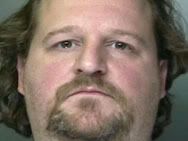
Oct. 18, 2006 — A technology reporter for Wired Magazine uncovered hundreds of convicted sex offenders on MySpace with a computer program that he developed, leading to one man's arrest.
There are more than 100 million users on MySpace, an online social networking service largely used by young people who post profiles and pictures of themselves, but it's also used by another group: sexual predators.
How many sexual predators use the site is a question that MySpace — and sites like it — have long contended is too difficult to answer.
But for Wired senior editor Kevin Poulsen that answer came quickly.
"There were some with records of crimes against children with a large number of children on their lists," Poulsen told ABC News.
Using names and addresses of convicted sex offenders on state registries, the editor designed his own computer program to cross-reference that information with profiles listed on MySpace.
Inputting close to 386,000 sex offenders from 46 states, Poulsen found thousands of possible matches.
Poulsen began looking at the site, combing through 7,000 profiles. Among them, he said, were 744 sex offenders with profiles on the site.
One particular sex offender stood out.
"In his MySpace profile, he had links to half a dozen kids — all young boys — and he was posting messages to their public comment boards of a sexual nature," Poulsen said.
The police stepped in, and posing as a teenager, investigators started sending him messages.
He took the bait.
"This guy was a registered level three sex offender with a profile on MySpace, actively looking for young boys to molest," said Sgt. John Cowie of the Suffolk County Police Department in New York.
The husband and father of five is now behind bars.
For its part, MySpace said it had been pushing for federal legislation that would require convicted sex offenders to register their e-mail addresses, even testifying before Congress about the difficulties in policing these types of sites.
Child advocates said this most recent case proved that MySpace and sites like it could do more right now.
In the most recent arrest, the convicted sex offender had been out of prison for just a year before his profile was on MySpace.
He is scheduled to be in court later this week.
Tuesday, October 10, 2006
JASON SETH ALBION O'CONNELL

JASON SETH ALBION O'CONNELL
UNLAWFUL FLIGHT TO AVOID PROSECUTION - ATTEMPTED KIDNAPPING, ATTEMPTED SEX ABUSE, SEX ABUSE
Jason Seth Albion O'Connell, a convicted felon, is being sought for his alleged involvement in the attempted kidnapping of three young girls near Springfield, Oregon. On August 27, 2006, O'Connell allegedly approached a seven-year-old girl who was playing near her apartment. He used a lollipop to try and entice her to accompany him. O'Connell then grabbed and dragged her into the nearby bushes and attempted to pull down her pants, but was stopped by a passerby and fled on foot. Approximately thirty minutes later, O'Connell tried to entice two five-year-old girls at a nearby playground. He grabbed one of the girls, forced her to the ground, and allegedly assaulted her. When the second girl started to scream, he stopped his assault and again fled on foot.
On September 21, 2006, the Lane County Circuit Court, Eugene, Oregon, issued a local arrest warrant for O'Connell charging him with attempted kidnapping, attempted sex abuse, and sex abuse. On September 25, 2006, a federal arrest warrant was issued in the United States District Court, District of Oregon, Eugene, Oregon, charging O'Connell with unlawful flight to avoid prosecution.
Additionally, O'Connell is wanted in Santa Cruz, California, for the 1998 sexual assault of a three-year-old girl. A local arrest warrant was issued charging him with sexual assault and a federal arrest warrant was issued charging him with unlawful flight to avoid prosecution.
LILIANA LUCERO MERCADO GONZALEZ - Wanted
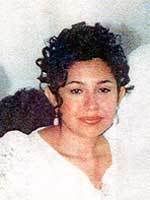
LILIANA LUCERO MERCADO GONZALEZ
FOREIGN POLICE COOPERATION - FELONIOUS HOMICIDE
Liliana Lucero Mercado Gonzalez and her husband, Francisco Javier Lopez Gonzalez, are wanted for murder. On November 12, 1999, in the state of Aguascalientes, Mexico, the body of an unidentified male child, approximately 4 years old, was discovered in a trash container. The body appeared badly beaten and it was reported that the boy had suffered physical abuse his entire life. The unidentified child was dubbed by the news media as the "Nino del Contendor," which from Spanish translates to "the container boy". In June of 2001, it was determined that the unidentified victim was the son of Liliana Lucero Mercado Gonzalez and the stepson of Francisco Javier Lopez Gonzalez.
On July 2, 2002, a state arrest warrant was issued by the state of Aguascalientes, Mexico, after charging Liliana Lucero Mercado Gonzalez with felonious homicide.

